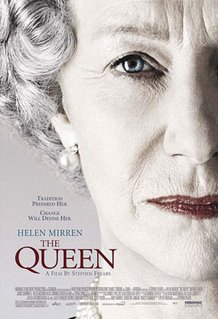
Even though the tragic accident that took the life of Princess Diana occurred 10 years ago, it is still hotly debated and discussed by many as if it had happened more recently.
The Queen takes us back to the time when the world was stunned by the news, all of England was looking for support and guidance, and the Royal Family had seemingly isolated themselves from the people. Director Stephen Frears (
Mrs. Henderson Presents,
High Fidelity) tackles this subject matter with deftness and subtlety. The movie is not so much about how the "People's Princess" died that night in August 1997, but about the effect her death had on a country. Skillfully mixing archival news footage with wonderfully acted and directed dramatizations,
The Queen is a thoughtful and intimate look at multiple sides of a very complex story.
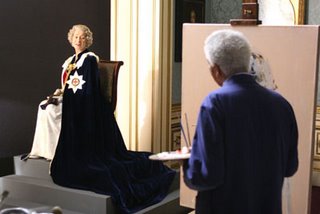
Set mainly during the days leading up to Diana's funeral, the film follows the struggles of Queen Elizabeth II (Helen Mirren in an Oscar-worthy role) and the rest of the Royal Family as they strive to hold a private family funeral for the Princess, away from the public eye. However, when news of Diana's death hits the media, the people respond stronger than anyone could have imagined, and demand a public funeral service, as well as support from the Royal Family. When the Family decides to remain discreet and not make a public announcement about Diana, Queen Elizabeth and everyone else are thrown into a negative light as they are vilified by the press and shunned by the masses. The public instead embraces newly elected Prime Minister Tony Blair (Michael Sheen), who has not only spoken openly about his grief at the recent tragedy, but is striving for change and a more modern approach to the way things are run. Elizabeth becomes torn between upholding old traditions of the monarchy that she has sworn to uphold, and answering the cries of the people who are hungry for change.
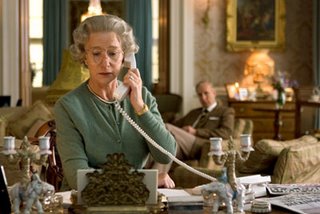
Those of you who are expecting a re enactment of the sensationalism and uproar that was directed toward the paparazzi during the aftermath of the accident will find none of it here.
The Queen takes an almost sheltered look at this tragic moment, and allows us to look at it almost entirely through the eyes of the Royal Family. This gives the film a somewhat laid back, but no less powerful, tone that works. Rather than displaying something that was splashed all over the newspapers and television, screenwriter Peter Morgan (
The Last King of Scotland) takes an intentionally small and personal look. We view glimpses of the public's reaction through numerous pieces of archival TV footage that is spliced into the film, but the action itself is set entirely within the confined walls of Queen Elizabeth's home. This allows us to become closer to the true heart of the story, and the characters that inhabit it. The Queen's somewhat distant initial reaction to Diana's death was seen by many as an act of uncaring, especially since it was widely known that Diana was never exactly widely accepted by the family on the side of her former husband, Prince Charles (portrayed in this film by Alex Jennings). This film argues the case that Elizabeth simply wanted to uphold the traditions of the Royals, which has mainly forced them to seclude their private lives and feelings from the public. The movie is an intimate portrait of a woman torn between what she knows is expected of her, and the change that the public is demanding from her. She is having a hard time finding a balance that will please everyone, but never wavers in her notion that she is doing the right thing in whatever choice she makes. This approach of focusing solely on the Queen and the rest of the Royal Family, instead of the outside world, is a smart move, as it allows us to not only us to sympathize with the main character and her decisions, but it also humanizes a public and iconic figure in a way that no previous film ever has before.
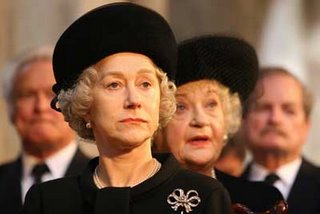
When both Queen Elizabeth and the movie itself venture out into the outside world to meet and speak to the public, the film creates an appropriately touching and moving mood. The scene where Elizabeth walks along the gates of Buckingham Palace and sees the various flowers and notes of mourning that the people have left behind for Diana, is undeniably moving in its simplicity. It is a powerful reminder of just what the public image of the Princess meant to people, and a wonderful re enactment of one of the rare moments when the Royals put themselves before the public. Much of the film's success lies with Helen Mirren, who completely nails the role of Queen Elizabeth in such a way that we are not just watching a simple imitation, but that she embodies just about everything about the actual woman. Almost from her opening scene, we forget that we are watching an actor's portrayal, and become lost in her performance. She is very personal and open in her performance, allowing us to sympathize and understand her. The way that she is able to not just transform herself but to also open up her character's emotions and feelings to us is subtle and extraordinary. It is truly one of the great performances to be featured in a film released in 2006. She is backed up by a wonderful supporting cast, with Michael Sheen easily getting the strongest reaction in his portrayal of Tony Blair. He too is torn between the respect he feels for the Queen, and his strong desire for change. He fears for Elizabeth's public image, and sees it personally with the way that his wife and some of his associates speak of her.
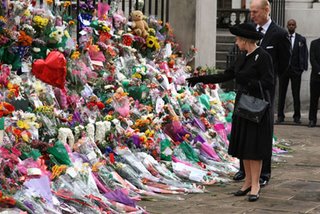 The Queen
The Queen is a movie that could have gone wrong in so many ways. It could have come across as stuffy and dull, or it could have not dug deep enough into its characters. I am happy to report that this film avoids just about every pitfall that could have brought it down. Aside from the fact that a few of the Royals such as Prince Charles and Prince Philip could have been given more to do, there is very little to find fault with here. This is a completely involving motion picture that entices almost from the very beginning. Not only does it allow us to enter a world that is typically closed off, but it does so in a way that is understated and heartfelt. It makes the right choice by not only showing us a side of the story we haven't heard, but by also giving equal time to all sides of the situation, so that the movie is never in danger of becoming too narrow in its focus.
The Queen is one of the great films of 2006.
 Even though the tragic accident that took the life of Princess Diana occurred 10 years ago, it is still hotly debated and discussed by many as if it had happened more recently. The Queen takes us back to the time when the world was stunned by the news, all of England was looking for support and guidance, and the Royal Family had seemingly isolated themselves from the people. Director Stephen Frears (Mrs. Henderson Presents, High Fidelity) tackles this subject matter with deftness and subtlety. The movie is not so much about how the "People's Princess" died that night in August 1997, but about the effect her death had on a country. Skillfully mixing archival news footage with wonderfully acted and directed dramatizations, The Queen is a thoughtful and intimate look at multiple sides of a very complex story.
Even though the tragic accident that took the life of Princess Diana occurred 10 years ago, it is still hotly debated and discussed by many as if it had happened more recently. The Queen takes us back to the time when the world was stunned by the news, all of England was looking for support and guidance, and the Royal Family had seemingly isolated themselves from the people. Director Stephen Frears (Mrs. Henderson Presents, High Fidelity) tackles this subject matter with deftness and subtlety. The movie is not so much about how the "People's Princess" died that night in August 1997, but about the effect her death had on a country. Skillfully mixing archival news footage with wonderfully acted and directed dramatizations, The Queen is a thoughtful and intimate look at multiple sides of a very complex story. Set mainly during the days leading up to Diana's funeral, the film follows the struggles of Queen Elizabeth II (Helen Mirren in an Oscar-worthy role) and the rest of the Royal Family as they strive to hold a private family funeral for the Princess, away from the public eye. However, when news of Diana's death hits the media, the people respond stronger than anyone could have imagined, and demand a public funeral service, as well as support from the Royal Family. When the Family decides to remain discreet and not make a public announcement about Diana, Queen Elizabeth and everyone else are thrown into a negative light as they are vilified by the press and shunned by the masses. The public instead embraces newly elected Prime Minister Tony Blair (Michael Sheen), who has not only spoken openly about his grief at the recent tragedy, but is striving for change and a more modern approach to the way things are run. Elizabeth becomes torn between upholding old traditions of the monarchy that she has sworn to uphold, and answering the cries of the people who are hungry for change.
Set mainly during the days leading up to Diana's funeral, the film follows the struggles of Queen Elizabeth II (Helen Mirren in an Oscar-worthy role) and the rest of the Royal Family as they strive to hold a private family funeral for the Princess, away from the public eye. However, when news of Diana's death hits the media, the people respond stronger than anyone could have imagined, and demand a public funeral service, as well as support from the Royal Family. When the Family decides to remain discreet and not make a public announcement about Diana, Queen Elizabeth and everyone else are thrown into a negative light as they are vilified by the press and shunned by the masses. The public instead embraces newly elected Prime Minister Tony Blair (Michael Sheen), who has not only spoken openly about his grief at the recent tragedy, but is striving for change and a more modern approach to the way things are run. Elizabeth becomes torn between upholding old traditions of the monarchy that she has sworn to uphold, and answering the cries of the people who are hungry for change. Those of you who are expecting a re enactment of the sensationalism and uproar that was directed toward the paparazzi during the aftermath of the accident will find none of it here. The Queen takes an almost sheltered look at this tragic moment, and allows us to look at it almost entirely through the eyes of the Royal Family. This gives the film a somewhat laid back, but no less powerful, tone that works. Rather than displaying something that was splashed all over the newspapers and television, screenwriter Peter Morgan (The Last King of Scotland) takes an intentionally small and personal look. We view glimpses of the public's reaction through numerous pieces of archival TV footage that is spliced into the film, but the action itself is set entirely within the confined walls of Queen Elizabeth's home. This allows us to become closer to the true heart of the story, and the characters that inhabit it. The Queen's somewhat distant initial reaction to Diana's death was seen by many as an act of uncaring, especially since it was widely known that Diana was never exactly widely accepted by the family on the side of her former husband, Prince Charles (portrayed in this film by Alex Jennings). This film argues the case that Elizabeth simply wanted to uphold the traditions of the Royals, which has mainly forced them to seclude their private lives and feelings from the public. The movie is an intimate portrait of a woman torn between what she knows is expected of her, and the change that the public is demanding from her. She is having a hard time finding a balance that will please everyone, but never wavers in her notion that she is doing the right thing in whatever choice she makes. This approach of focusing solely on the Queen and the rest of the Royal Family, instead of the outside world, is a smart move, as it allows us to not only us to sympathize with the main character and her decisions, but it also humanizes a public and iconic figure in a way that no previous film ever has before.
Those of you who are expecting a re enactment of the sensationalism and uproar that was directed toward the paparazzi during the aftermath of the accident will find none of it here. The Queen takes an almost sheltered look at this tragic moment, and allows us to look at it almost entirely through the eyes of the Royal Family. This gives the film a somewhat laid back, but no less powerful, tone that works. Rather than displaying something that was splashed all over the newspapers and television, screenwriter Peter Morgan (The Last King of Scotland) takes an intentionally small and personal look. We view glimpses of the public's reaction through numerous pieces of archival TV footage that is spliced into the film, but the action itself is set entirely within the confined walls of Queen Elizabeth's home. This allows us to become closer to the true heart of the story, and the characters that inhabit it. The Queen's somewhat distant initial reaction to Diana's death was seen by many as an act of uncaring, especially since it was widely known that Diana was never exactly widely accepted by the family on the side of her former husband, Prince Charles (portrayed in this film by Alex Jennings). This film argues the case that Elizabeth simply wanted to uphold the traditions of the Royals, which has mainly forced them to seclude their private lives and feelings from the public. The movie is an intimate portrait of a woman torn between what she knows is expected of her, and the change that the public is demanding from her. She is having a hard time finding a balance that will please everyone, but never wavers in her notion that she is doing the right thing in whatever choice she makes. This approach of focusing solely on the Queen and the rest of the Royal Family, instead of the outside world, is a smart move, as it allows us to not only us to sympathize with the main character and her decisions, but it also humanizes a public and iconic figure in a way that no previous film ever has before. When both Queen Elizabeth and the movie itself venture out into the outside world to meet and speak to the public, the film creates an appropriately touching and moving mood. The scene where Elizabeth walks along the gates of Buckingham Palace and sees the various flowers and notes of mourning that the people have left behind for Diana, is undeniably moving in its simplicity. It is a powerful reminder of just what the public image of the Princess meant to people, and a wonderful re enactment of one of the rare moments when the Royals put themselves before the public. Much of the film's success lies with Helen Mirren, who completely nails the role of Queen Elizabeth in such a way that we are not just watching a simple imitation, but that she embodies just about everything about the actual woman. Almost from her opening scene, we forget that we are watching an actor's portrayal, and become lost in her performance. She is very personal and open in her performance, allowing us to sympathize and understand her. The way that she is able to not just transform herself but to also open up her character's emotions and feelings to us is subtle and extraordinary. It is truly one of the great performances to be featured in a film released in 2006. She is backed up by a wonderful supporting cast, with Michael Sheen easily getting the strongest reaction in his portrayal of Tony Blair. He too is torn between the respect he feels for the Queen, and his strong desire for change. He fears for Elizabeth's public image, and sees it personally with the way that his wife and some of his associates speak of her.
When both Queen Elizabeth and the movie itself venture out into the outside world to meet and speak to the public, the film creates an appropriately touching and moving mood. The scene where Elizabeth walks along the gates of Buckingham Palace and sees the various flowers and notes of mourning that the people have left behind for Diana, is undeniably moving in its simplicity. It is a powerful reminder of just what the public image of the Princess meant to people, and a wonderful re enactment of one of the rare moments when the Royals put themselves before the public. Much of the film's success lies with Helen Mirren, who completely nails the role of Queen Elizabeth in such a way that we are not just watching a simple imitation, but that she embodies just about everything about the actual woman. Almost from her opening scene, we forget that we are watching an actor's portrayal, and become lost in her performance. She is very personal and open in her performance, allowing us to sympathize and understand her. The way that she is able to not just transform herself but to also open up her character's emotions and feelings to us is subtle and extraordinary. It is truly one of the great performances to be featured in a film released in 2006. She is backed up by a wonderful supporting cast, with Michael Sheen easily getting the strongest reaction in his portrayal of Tony Blair. He too is torn between the respect he feels for the Queen, and his strong desire for change. He fears for Elizabeth's public image, and sees it personally with the way that his wife and some of his associates speak of her. The Queen is a movie that could have gone wrong in so many ways. It could have come across as stuffy and dull, or it could have not dug deep enough into its characters. I am happy to report that this film avoids just about every pitfall that could have brought it down. Aside from the fact that a few of the Royals such as Prince Charles and Prince Philip could have been given more to do, there is very little to find fault with here. This is a completely involving motion picture that entices almost from the very beginning. Not only does it allow us to enter a world that is typically closed off, but it does so in a way that is understated and heartfelt. It makes the right choice by not only showing us a side of the story we haven't heard, but by also giving equal time to all sides of the situation, so that the movie is never in danger of becoming too narrow in its focus. The Queen is one of the great films of 2006.
The Queen is a movie that could have gone wrong in so many ways. It could have come across as stuffy and dull, or it could have not dug deep enough into its characters. I am happy to report that this film avoids just about every pitfall that could have brought it down. Aside from the fact that a few of the Royals such as Prince Charles and Prince Philip could have been given more to do, there is very little to find fault with here. This is a completely involving motion picture that entices almost from the very beginning. Not only does it allow us to enter a world that is typically closed off, but it does so in a way that is understated and heartfelt. It makes the right choice by not only showing us a side of the story we haven't heard, but by also giving equal time to all sides of the situation, so that the movie is never in danger of becoming too narrow in its focus. The Queen is one of the great films of 2006.





1 Comments:
The film is brilliant in every way, save one. In reality, the Queen's reactions to Diana's death surely covered a range of ambivalent feelings, and was not just a cold insistence on protocol, as suggested by the film.
Prince Charles tells his mother, "The Diana we knew was very different than the Diana idolized by the public", but this truth is never developed in the film. I'll mention it here.
While the "people's princess" remains the icon of superficial popular culture, the Royals knew a very different, darker character behind the facades of glamour and pseudo-compassion.
Both Diana and her brother, Charles Spencer, suffered from Borderline Personality Disorder caused by their mother's abandoning them as young children. A google search reveals that Diana is considered a case study in BPD by mental health professionals.
For Charles Spencer, BPD meant insatiable sexual promiscuity (his wife was divorcing him at the time of Diana's death). For Diana, BPD meant intense insecurity and insatiable need for attention and affection which even the best husband could never fulfill.
Clinically, it's clear that the Royal family did not cause her "problems". Rather, Diana brought her multiple issues into the marriage, and the Royal family was hapless to deal with them.
Her illness, untreated, sowed the seeds of her fast and unstable lifestyle, and sadly, her tragic fate.
By redtown, at 8:18 AM
redtown, at 8:18 AM
Post a Comment
<< Home